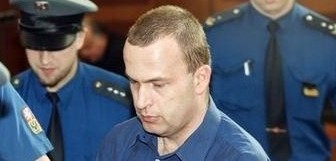Petr Zelenka, a nurse at an east Bohemian hospital,
wanted to conduct a test: How long would it take doctors to realize he
was killing patients?
Zelenka, 30, gave this as the reason behind a spree
that killed eight patients at Havlíčkův Brod Hospital this year when he
was arrested and confessed to the crimes Dec. 1.
He is now behind bars, charged with eight murders and
nine more attempts, and could face a life sentence, although lawyers say
he is unlikely to get more than 15 years.
But the fallout from the case continues, largely
because the answer to Zelenka's question has become apparent: far too
long.
Doctors at Havlíčkův Brod first suspected that
Zelenka could be connected with a series of unusual deaths in May, but
didn't file a criminal complaint and fire him until September. Between
his sacking from Havlíčkův Brod and his arrest, Zelenka even managed to
get another nursing job, at Jičín Hospital in east Bohemia;
administrators there weren't warned about him and didn't suspect a thing.
As an investigation continues, health experts and
patients' rights groups are questioning the system that allowed the
nurse to carry out his crimes, saying not only did Havlíčkův Brod
managers err by not acting sooner, but that the case points to a weak
system of safety controls.
"A flawed system is at the root of least 95 percent
of all medical mistakes," says David Marx, head of the Czech Association
for Quality in Health Care. "In a well-functioning hospital anything
unusual should immediately set off alarms. This didn't happen here."
Health Minister Tomáš Julínek set up a special
committee Dec. 6 to look into the case. Doctors at Havlíčkův Brod are
under investigation, and the hospital's director, Josef Pejchl, was
sacked for taking too long to fire Zelenka.
A 'determined murderer'
Patients' rights groups are divided on the issue.
Pavel Vepřek, head of the Czech Health Forum, which promotes healthcare
reforms, said neither the Havlíčkův Brod doctors nor the system were at
fault.
"These were the criminal acts of one individual. You
can't blame it on the system," he said. "I don't think there exist any
safety measures anywhere in the world that can protect patients against
a determined murderer."
Czech Patients Association President Luboš Olejár, on
the other hand, said that Zelenka's case is an example of shortcomings
in safety checks and security measures at Czech hospitals.
"It's absolutely outrageous," he said. "Something as
simple as careful documentation of the amount of drugs each patient is
given could have prevented this tragedy. There are clearly holes in the
system, but the doctors involved are also responsible."
In May, Pavel Longin, the Havlíčkův Brod hospital's
head doctor, noticed that an abnormally. high number of patients in the
intensive care ward were bleeding to death. He discovered that unusually
high doses of Heparin, a common blood thinner, the use of which
typically goes undocumented in hospitals, were causing the bleeding.
Zelenka's name surfaced as the last nurse to care for
the deceased.
Longin told the daily Mladá fronta Dnes that
he feels that his conscience is clear and he could not have acted sooner
because he lacked direct evidence implicating Zelenka.
Ondřej Dostál, a lawyer who specializes in bioethics,
says the doctors may face charges if it is proven that they could have
prevented deaths.
"According to law, anyone who suspects that a crime
is about to take place is obliged to try and prevent it," Dostál said.
The Havlíčkův Brod district police department is also
under investigation. The police received the criminal complaint against
Zelenka Oct. 23, more than a month before they arrested him.
Stricter controls
Meanwhile, the Health Ministry is promising a
stricter system of controls at hospitals, starting with the demand that
they obtain either national or international accreditation, which is
currently not mandatory.
Paradoxically, the Czech Health Care Institute rated
Havlíčkův Brod the top hospital in the Vysočina region and the eighth-best
hospital in the country this November for its outstanding level of care.
Longin says, however, that the hospital doesn't have
any formal system of controls in place that could have prevented the
crimes from happening.
Some doctors like Marx say accreditation would help.
Only two Czech hospitals, Na Homolce Hospital and the
Central Military Hospital — both in Prague — have international
accreditation. Eight more are accredited nationally.
Marx says that by the end of next year 30 new
hospitals should fulfill the requirements for national accreditation,
ranging from building safety to data storage and employee screening.
Havlíčkův Brod isn't one of them.
Marx adds that more thorough documentation of
medication distribution is needed.
Requiring two nurses to be present when a patient
receives any medication might also be a good idea, according to Marx.

